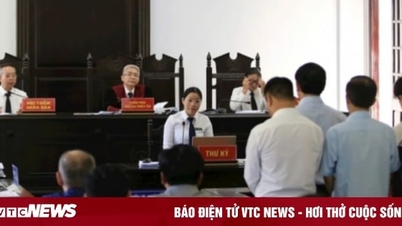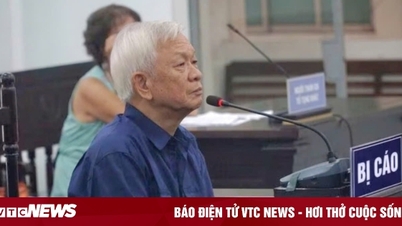Criminal, civil and administrative procedural laws all stipulate that trials are conducted at two levels, including first instance and appeal. So, during the appeal trial, if the defendant does not appeal and the defendant is not appealed or protested, can the appellate panel amend the first instance judgment to reduce the sentence for that defendant? Or will it only consider defendants who have appealed or protested?
Pursuant to Clause 1, Article 355 of the 2015 Criminal Procedure Code, the authority of the Appellate Trial Council regarding the first-instance judgment is stipulated as follows: Not accepting the appeal or protest and upholding the first-instance judgment; Amending the first-instance judgment; Annulling the first-instance judgment and transferring the case file for re-investigation or re-trial; Annulling the first-instance judgment and suspending the case; Suspending the appeal trial.
Clause 1 and Clause 2, Article 358 of the 2015 Criminal Procedure Code stipulate the annulment of the first instance judgment for re-investigation or re-trial.
Specifically, the Appellate Court shall annul the first instance judgment for reinvestigation in the following cases: There is reason to believe that the first instance court omitted a crime, a criminal, or initiated a prosecution or investigation for a more serious crime than the one declared in the first instance judgment; The investigation at the first instance court was incomplete and the appellate court could not supplement it; There was a serious violation of procedural law during the investigation and prosecution stage.
The appellate panel shall annul the first-instance judgment for retrial at the first-instance level with a new panel of judges in the following cases: The first-instance trial panel does not have the correct composition as prescribed in the 2015 Criminal Procedure Code; There is a serious violation of procedural law during the first-instance trial; The person is declared not guilty by the first-instance court but there is reason to believe that he/she has committed a crime; The defendant is exempted from criminal liability, exempted from punishment or applied judicial measures without basis; The first-instance judgment has serious errors in the application of the law but does not fall under the case where the appellate panel amends the judgment as prescribed in Article 357 of the 2015 Criminal Procedure Code.
Pursuant to Clause 1 and Clause 3, Article 357 of the 2015 Criminal Procedure Code, the provisions on amending the first instance judgment are as follows:
When there is a basis to determine that the first instance judgment is not consistent with the nature, level, and consequences of the crime, the defendant's personal circumstances, or there are new circumstances, the Appellate Court has the right to amend the first instance judgment as follows: Exempt the defendant from criminal liability or punishment; not apply additional punishment; not apply judicial measures; Apply articles and clauses of the Penal Code on lesser crimes; Reduce the defendant's punishment; Reduce the level of compensation for damages and amend the decision on handling evidence; Change to another punishment of a lighter type; Maintain or reduce the prison sentence and grant a suspended sentence.
If there is a basis, the Appellate Court may amend the first instance judgment according to the above provisions for defendants who do not appeal or are not appealed or protested.
Based on the above provisions, if there is a basis, the Appellate Court can amend the first instance judgment for defendants who do not appeal or are not appealed or protested.
Specifically: Exempting the defendant from criminal liability or punishment; not applying additional punishment; not applying judicial measures; Applying articles and clauses of the Penal Code on lesser crimes; Reducing the penalty for the defendant; Reducing the amount of compensation for damages and amending the decision on handling evidence; Changing to another lighter penalty; Maintaining or reducing the prison sentence and granting a suspended sentence.
Thus, the Appellate Court can still amend the first instance judgment to reduce the sentence for defendants who do not appeal or are not appealed or protested when there is a basis.
TM
Source







![[Photo] Hanoi morning of October 1: Prolonged flooding, people wade to work](https://vphoto.vietnam.vn/thumb/1200x675/vietnam/resource/IMAGE/2025/10/1/189be28938e3493fa26b2938efa2059e)
































![[Photo] President Luong Cuong receives President of the Cuban National Assembly Esteban Lazo Hernandez](https://vphoto.vietnam.vn/thumb/1200x675/vietnam/resource/IMAGE/2025/9/30/4d38932911c24f6ea1936252bd5427fa)
![[Photo] The 1st Congress of Phu Tho Provincial Party Committee, term 2025-2030](https://vphoto.vietnam.vn/thumb/1200x675/vietnam/resource/IMAGE/2025/9/30/1507da06216649bba8a1ce6251816820)
![[Photo] Panorama of the cable-stayed bridge, the final bottleneck of the Ben Luc-Long Thanh expressway](https://vphoto.vietnam.vn/thumb/1200x675/vietnam/resource/IMAGE/2025/9/30/391fdf21025541d6b2f092e49a17243f)


























































Comment (0)